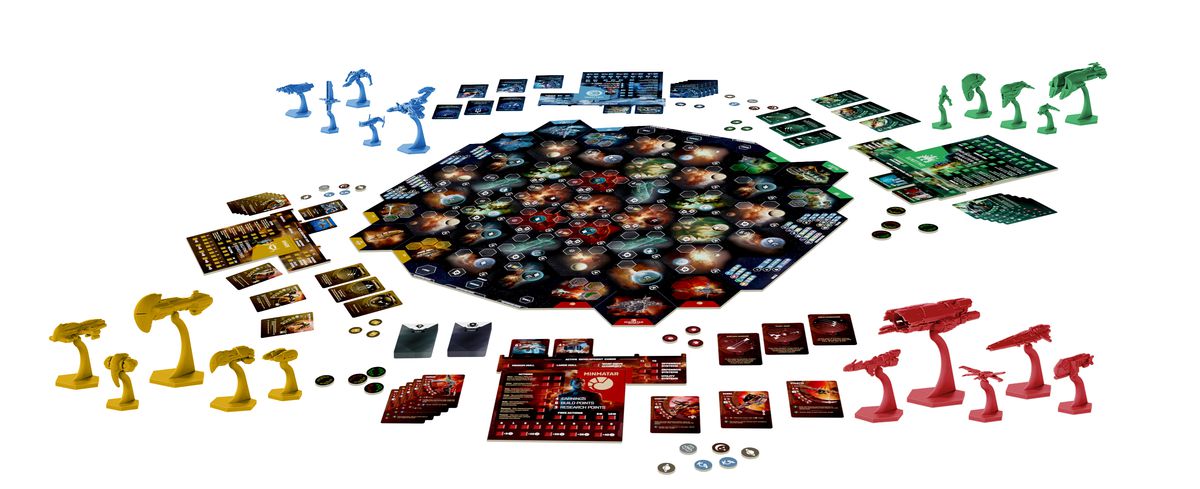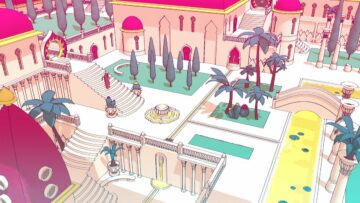The last five years of board gaming innovation has proven that video game licenses can hold their own against the best that the tabletop world has to offer. Look no further than Dorfromantik, the breakout indie hit that lit up the charts on Steam when it was released in 2022. In 2023 its tabletop interpretation, Dorfromantik: The Board Game, went on to win the Spiel des Jahres, arguably the most prestigious award in all of tabletop gaming.
For 2024 it seems as though many more developers in the world of board gaming suddenly want to throw their hat into the ring with high-profile video game crossovers of their own. Studios are drawing up projects based on other indie hits, like Dead Cells, as well as the bestselling franchise in video gaming history, Activision’s juggernaut Call of Duty. Iceland’s CCP Games wants a piece of the action as well. The crowdfunding campaign for Eve: War for New Eden goes live today, and Polygon sat down with the developers at Titan Forge to learn more.

Eve Online is one of the most notoriously complex games ever created, one part spacefaring economic simulation, one part social experiment, and two parts spreadsheets in space. But beneath the layers that obscure it, Eve is dead simple: It’s a competitive 4X game where players explore a universe, exploit it for resources, expand their empires, and exterminate the opposition. It’s a beloved genre with just as rich a history on the tabletop as in video gaming. But to bring all the same features wholesale into a board game would be madness. Instead, the team at Titan Forge is planning something on a slightly different scale.
Up to four players will each take on the role of one of Eve’s iconic in-fiction factions — the Amarr Empire, the Caldari State, the Gallente Federation, or the Minmatar Republic. In a recent interview, co-designer and Eve veteran Radosław Dmochowski said that each faction will start the game on a tile representing their home star system, and with a thick stack of cards representing 55 different advanced technologies. Just as in the video game, players are free to pursue those technologies in whatever order they choose. But subterfuge is baked in. That’s because no one at the table will know what the others have built until they mount their first attack.
“Once you get some research tokens,” explained co-designer Jakub Sawka, “you place them on technologies, and then you can reveal them at important locations during your turn to surprise your enemies.”
Players will pair those technologies with eight different starships — the base game comes with 114 miniatures in total, spread across 32 different sculpts. Combat is likewise inspired by the video game, with factors such as a ship’s size and its weapons playing important roles in the outcome of each battle.
“For large ships it’s harder to lock a target, especially a smaller one,” said Dmochowski, “ But once they lock it, they will just instantly blow it if they do damage. And it’s exactly the opposite for small ships. If you have a squad of frigates fighting a battleship, they might not be able to do enough damage to go through the shields. […] The combat is really a game inside a game, but it’s not too complex. It might feel a bit hard, but after one or two fights you just instantly get how it works.”
But what of Eve’s legendary player-run corporations? Their exploits are what often make headlines, dashing hundreds of thousands of dollars of ships in massive battles or pulling off in-game heists on a massive scale. While Titan Forge won’t be inviting players to start an online casino in order to bankroll their wars, the game’s event deck will bring in similar kinds of game-altering effects at random. It’s these and other nods to the game’s rich history that turned the heads of the game’s dedicated community in September last year at CCP Games’ annual celebration.

“Seeing the Eve faithful engage with War for New Eden’s prototype firsthand at Fanfest was remarkable,” Eve brand director Grant Tasker told Polygon in an email. “Their sheer excitement over experiencing iconic New Eden spaceships and locations in tabletop form was palpable.”
But Eve fans wanted more than just excellent gameplay — they wanted beautiful starships as well.
Titan Forge is best known for its work making miniatures, especially files that can be used in 3D printers by consumers at home. That means it was relatively quick work to turn CCP’s renders into miniatures. Then, with just a flip of a switch, the Polish company was able to churn out oversized miniatures meant to show off the detail of their work to large crowds. But these mega-minis, each some 200% larger than those available in the base game, were a hit with fans. Now they’ll be offered as part of the Capital Box, with every other game component — even the dice — embiggened to match that scale.
“[Titan Forge has] already shown their talent for skillfully adapting complex systems into accessible, strategic tabletop experiences,” added Tasker. “They’ve built a board game evoking Eve’s economy, spaceship theorycrafting, conquests, and battles that clearly enthused prototype players. Between their existing production expertise and connections to the Eve community, Titan Forge seems well-equipped to deliver an exceptional tabletop experience worthy of both Eve loyalists and tabletop audiences.”
The Kickstarter campaign launching today includes the base game, which, at roughly $130, is comparable in price to other 4X games of the same scope and scale. There will also be three different expansions made available as add-ons, which will add massive titan-sized ships to the game as well as a unique fifth faction. Meanwhile, the Capital Box tier will set players back more than $433. The campaign for Eve: War for New Eden runs until late February, with delivery promised by December.
- SEO Powered Content & PR Distribution. Get Amplified Today.
- PlatoData.Network Vertical Generative Ai. Empower Yourself. Access Here.
- PlatoAiStream. Web3 Intelligence. Knowledge Amplified. Access Here.
- PlatoESG. Carbon, CleanTech, Energy, Environment, Solar, Waste Management. Access Here.
- PlatoHealth. Biotech and Clinical Trials Intelligence. Access Here.
- Source: https://www.polygon.com/tabletop-games/24047322/eve-online-board-game-kickstarter-preview
- :has
- :is
- :not
- :where
- $UP
- 114
- 2022
- 2023
- 2024
- 32
- 3d
- a
- Able
- accessible
- across
- Action
- adapting
- add
- added
- advanced
- After
- against
- All
- already
- also
- an
- and
- annual
- ARE
- arguably
- AS
- At
- attack
- audiences
- available
- award
- back
- bankroll
- base
- based
- Battle
- battles
- BE
- beautiful
- because
- beloved
- BEST
- bestselling
- between
- bigger
- Bit
- blow
- board
- both
- brand
- breakout
- bring
- built
- but
- by
- Campaign
- CAN
- Cards
- ccp
- ccp games
- Celebration
- CGI
- Charts
- Choose
- clearly
- combat
- comes
- community
- company
- comparable
- competitive
- complex
- component
- Connections
- Consumers
- Corporations
- created
- Crowdfunding
- Crowdfunding Campaign
- damage
- dead
- December
- deck
- dedicated
- deliver
- delivery
- detail
- developers
- different
- Director
- do
- dollars
- down
- drawing
- during
- each
- Economic
- economy
- eden
- effects
- eight
- Empire
- enemies
- engage
- enough
- especially
- Ether (ETH)
- eve
- Even
- Event
- EVER
- Every
- exactly
- excellent
- exceptional
- Excitement
- existing
- Expand
- experience
- Experiences
- experiencing
- expertise
- explained
- Exploit
- exploits
- explore
- factions
- factors
- faithful
- fans
- faster
- Features
- February
- Federation
- feel
- fifth
- fighting
- fights
- Files
- First
- five
- Flip
- For
- forge
- form
- four
- Franchise
- Free
- further
- game
- gameplay
- Games
- gaming
- genre
- get
- Go
- Goes
- grant
- Hard
- harder
- hat
- Have
- Headlines
- heads
- high-profile
- history
- Hit
- Hits
- hold
- Home
- How
- HTTPS
- Hundreds
- iconic
- if
- important
- in
- includes
- Indie
- Innovation
- inside
- inspired
- instantly
- instead
- interpretation
- Interview
- into
- inviting
- IT
- ITS
- jpg
- just
- kickstarter
- Know
- known
- large
- larger
- Last
- Last Year
- Late
- launching
- layers
- LEARN
- legendary
- licenses
- like
- likewise
- live
- locations
- lock
- Look
- made
- make
- Making
- many
- massive
- Match
- means
- meant
- Meanwhile
- might
- more
- most
- MOUNT
- New
- no
- now
- of
- off
- offer
- offered
- often
- on
- once
- ONE
- online
- opposite
- opposition
- or
- order
- Other
- Others
- out
- Outcome
- over
- own
- pair
- palpable
- part
- parts
- piece
- Place
- planning
- plato
- Plato Data Intelligence
- PlatoData
- players
- playing
- Polish
- Polygon
- prestigious
- price
- Production
- projects
- promised
- prototype
- proven
- pulling
- pursue
- Quick
- random
- really
- recent
- relatively
- released
- remarkable
- render
- rendered
- renders
- representing
- Republic
- research
- Resources
- reveal
- Rich
- Ring
- Role
- roles
- roughly
- runs
- Said
- same
- Scale
- scope
- seems
- September
- set
- ships
- show
- shown
- Shows
- similar
- Simple
- Size
- slightly different
- small
- smaller
- some
- something
- spread
- stack
- Star
- start
- State
- Steam
- Strategic
- studios
- such
- surprise
- Switch
- system
- Systems
- table
- Take
- Talent
- Target
- team
- Technologies
- than
- that
- The
- the world
- their
- Them
- then
- There.
- These
- they
- those
- though?
- thousands
- three
- Through
- tier
- titan
- to
- today
- Tokens
- told
- too
- Total
- TURN
- Turned
- two
- unique
- Universe
- until
- used
- veteran
- Video
- video game
- video gaming
- want
- wanted
- wants
- war
- was
- Weapons
- webp
- WELL
- went
- were
- What
- whatever
- when
- which
- while
- wholesale
- will
- win
- with
- Work
- works
- world
- worthy
- would
- year
- years
- you
- Your
- zephyrnet












